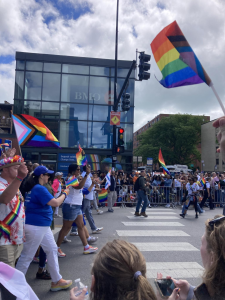Campus Free Speech Under Threat? Faculty Speak Out Against New Policy
March 21, 2023
Faculty are concerned an interim workplace violence policy could be used as retaliation for exercising their freedom of speech against their superiors or NEIU administration. The university is considering making its E1.99.0 Workplace Violence Interim Policy permanent. NEIU saw tempers flare on Jan. 24, 2023 protest at a Budget Town Hall meeting hosted by NEIU administrators. Some faculty and students protested solutions proposed by the administration to address the fiscal and enrollment crisis this university is currently facing. Now, many faculty fear action could be taken against them for speaking out against the administration or their superiors. This policy applies to all employees of the University, including faculty, staff and student workers. It fails to specifically mention the president, executive cabinet, deans, and other administrators. Under this directive, the examples of what can constitute a violent act include, but are not limited to, “verbal threats, harassing phone calls, abusive behavior, coercion, and shouting.” A section of the directive specifies further what behaviors are deemed a violation of the policy. These include:
- Challenging authority; insubordination.
- Regularly being unreasonably argumentative to the point of causing fear to members of the campus community.
- Unusual or strange behavior, such as paranoid comments, fixation on violence, or angry responses to situations.
- Making threats verbally, in writing, by email, via social media, or by voice mail.
- Blaming others for all problems.
Some of that behavior could describe the actions of protesters at the town hall on Jan. 24. 2023. While no physical violence took place, verbal conflicts could be considered violent acts under the policy. University administration could decide to bring about disciplinary action against some of the faculty. That is what faculty like Dr. Oliva Perlow, Department Chair of Sociology, are concerned about.
In an email, Dr. Perlow stated, “Without getting into the weeds on the multitude of ways in which this policy is problematic (violates ADA, Freedom of Speech, etc.), it is clear to us that this is a form of social control and an attempt to quash dissident voices. This is a public University, not a corporation or a prison.”
The Independent asked for clarification from Abby Murray, the Executive Director of Human Resources at NEIU. Murray stated, “As a university, NEIU is committed to and supports freedom of speech wholeheartedly. This policy, if approved, protects against harassing and threatening communications; it will not interfere with communications between colleagues. This policy has been drafted to help prevent violence in the workplace with the intent to protect the university community from potential intimidation or threats where, as the draft policy states, the person fears for their safety. There are examples of unacceptable behavior in the draft policy which do not interfere with free speech.”
While this is only an interim policy, it has not yet been adopted by the University. Many other educational institutions and businesses have adopted similar policies, according to Murray. The draft is similar to the Illinois Workplace Violence Prevention Act. If anyone in the NEIU community is concerned about language or examples in the draft, they are encouraged to submit changes or recommendations to Human Resources.
Upon further investigation into this policy by The Independent the Equal Opportunity and Nondiscrimination Policy G.17 link on page 3 of this directive “could not be found”. A senior faculty member who wishes to remain anonymous has pointed out this link needs to be fixed. Then they can give suggestions and recommendations for the policy to be updated. Murray also stated in her email, “NEIU is committed to providing a safe and healthy environment for employees to perform their jobs and students to learn.”





